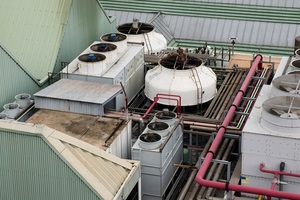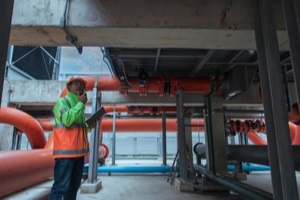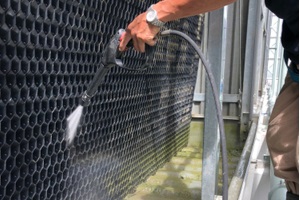 Buildings with cooling towers must follow certain rules and regulations in order to maintain standards of safety, including legionella laws for cooling towers, both for the people who work there and the public in the area. A major reason for this is to prevent the spread of Legionella.
Buildings with cooling towers must follow certain rules and regulations in order to maintain standards of safety, including legionella laws for cooling towers, both for the people who work there and the public in the area. A major reason for this is to prevent the spread of Legionella.
Typically, state and local laws describe the guidelines required; however, these regulations are not always identical between state and local agencies. The laws for cooling towers in New York City can differ from the laws required for the entire state, and knowing the similarities and differences allows those who operate cooling towers to fulfill all necessary requirements.
Legionella Laws For Cooling Towers
There are eight major areas of legislation regarding cooling towers for legionella laws for cooling towers. While much of this legislation is the same across both the city and the state, there are also distinct differences.
Registration
The first requirement that cooling tower operators must follow for city and state regulations is that they must register their cooling tower. Depending on the location of the tower, owners may need to register it with the city and with the state.
The registration must include key pieces of information about the tower, such as its address and intended use. New York state law has additional requirements for registration information, including whether the tower will be used year-round or seasonally, the method that will be used for disinfection, the person who performs maintenance and the year in which the cooling tower began operation.
Sampling
Secondly, owners of cooling towers must sample for Legionella every 90 days and report results greater than 1000 CFU (colony-forming units)/L to either the city or the state department within 24 hours.
Both city and state regulations have additional sampling requirements in the case of unexpected events such as power failure. An additional requirement in city legislation is that legionella samples need to be reported to the NYC cooling tower portal within 5 days of sampling from cooling towers.
Chemical Treatment
The water that cooling towers use must be treated with chemicals. New York City law also discusses constant chemical treatment in which chemicals are injected into the water by specialized equipment at scheduled intervals. This method enables chemical treatment to occur automatically and keeps buildings in compliance with regulatory guidance, which is typically interpreted as a need for treatment daily.
Monitoring
 The monitoring requirements for cooling towers are different for both the city and state. NYC requirements must monitor temperature, pH, conductivity, and biocides at least three times each week. While NY State requirements for healthcare facilities mirror NYC requirements, commercial and residential facilities are up to the discretion of the plan provider but no less than once per week.
The monitoring requirements for cooling towers are different for both the city and state. NYC requirements must monitor temperature, pH, conductivity, and biocides at least three times each week. While NY State requirements for healthcare facilities mirror NYC requirements, commercial and residential facilities are up to the discretion of the plan provider but no less than once per week.
Other tests and observations must be performed once weekly. City law specifies that a “responsible person” must monitor these variables and must do so manually; if your facility does not have anyone available or qualified for this position, experts from a compliance company can assist with this process.
Inspection
A “qualified person” must inspect cooling towers on behalf of the city and state every 90 days. They must also obtain annual certification. This qualified person must fit into specific categories such as an engineer, experience within the industry or an environmental consultant.
New York City law specifies that environmental consultants must have at least two years of experience related to water management, though the state does not hold this requirement. Still, it is best to utilize an experienced person and overshoot the minimum requirements.
Maintenance Program And Plan
Both city and state regulations require the development of a Maintenance Program and Plan (MPP). This plan specifies who is in charge of various testing. It also clarifies procedures that the cooling tower owners will follow to ensure the safety of their facility. This plan must comply with ASHRAE 188 standards. ASHRAE is an American system focused on standards of HVAC.
Various Other Requirements
Beyond the requirements outlined above, additional rules are also in place for both city and state regulatory compliance. These rules relate to cleaning, documentation, the materials used in tower construction, and various other areas of operation.
Corrective Action
 If cooling towers fail to abide by the laws outlined above for either the city or state, they may need to take corrective action. This will include fixing operational problems and clearly demonstrating that the remedy is effective and long-lasting. Owners may face penalties such as fees for non-compliance. The specific corrective action that civil authorities take may differ depending on city or state law.
If cooling towers fail to abide by the laws outlined above for either the city or state, they may need to take corrective action. This will include fixing operational problems and clearly demonstrating that the remedy is effective and long-lasting. Owners may face penalties such as fees for non-compliance. The specific corrective action that civil authorities take may differ depending on city or state law.
Consult The Professionals With Questions Related To Cooling Tower Laws
Cooling tower laws exist to protect individuals from the dangers of Legionella bacteria. These laws have many requirements that may change depending on where you operate and whether you are considering city or state regulations. If you have questions or concerns about the operation of your cooling tower, you do not need to tackle the process alone.
The experts at Tower Water would be happy to walk you through the regulatory processes required of your facility. Reach out to schedule an appointment.
